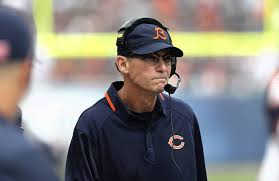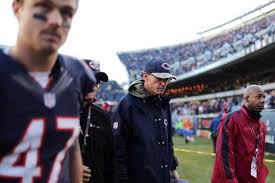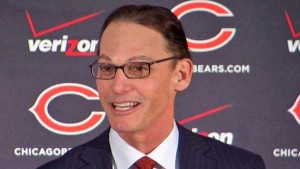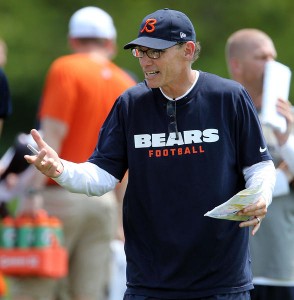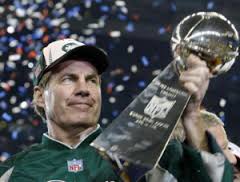By Jeremy Harris
Never mistake inarticulateness for gridiron stupidity. Two-time Super Bowl winning head coach Bill Parcells’ insufferable verbosity and constant misspeak would have made many English professors cringe, but his astute game management skills evidenced a highly-intelligent football mind
Bears head coach Marc Trestman often times sounds like a college English professor, but his game management decisions are beginning to evince a coaching ineptitude that has cost the Bears victories and is creating a credibility crisis.
Last season, the Bears were one more win from hanging an NFC North Division championship banner in Soldier Field. As we chronicled, Trestman’s mind-numbingly obtuse game-management decisions almost certainly cost the Bears two wins and a playoff berth. His explanations for these poor decisions were often dizzyingly incoherent and logically inconsistent and an insult to a fan base that is far too intelligent to be beguiled with fancy blather.
Unfortunately, Trestman’s blunders have continued apace this season, as have his muddled explanations.
Week Two at San Francisco
At the 13:23 mark of the first quarter, Bears rookie punter Pat O’Donnell, kicking from the end zone, had his punt blocked, giving the 49ers starting field position at the Bears eight-yard-line.
Fast forward to the 3:38 mark of the second quarter. The Bears faced a fourth down at their two-yard-line. Despite having all three timeouts at his disposal, Trestman allowed the play clock to expire, resulting in a delay-of-game penalty that pushed the Bears back a yard and forced O’Donnell to execute a punt with even less room to maneuver.
Perhaps Trestman wanted O’Donnell to assess the oral hygiene of the 49ers’ rushers.
Week Four vs. Green Bay
At the 3:50 mark of the second quarter, after his charges had scored a touchdown to take a 17-14 lead, Trestman ordered an onside kick, which was unsuccessful. After the game, Trestman justified the onside quick on the grounds that his team needed an additional possession to prevail against the Packers’ juggernaut offense.
Now trailing 21-17, the Bears started their final possession of the first half at their own 20. Following a five-yard dash by RB Matt Forte to their 38 and with two timeouts remaining, the Bears allowed twenty seconds to elapse before calling another play at the :36 mark. The Bears’ drive ended when TE Martellus Bennett caught a Jay Cutler pass and tried desperately but unsuccessfully to stretch the ball over the Packers’ goal-line as time expired in the first half.
Had the Bears showed more alacrity earlier in the drive, they undoubtedly would have had time to at least salvage a field goal attempt before halftime.
The following day, Cutler asserted that the Bears did not exhibit urgency in the early stages of the final drive because they had decided to “sit on” the ball to prevent Green Bay from gaining an additional possession before halftime Now, if the rationale for the onside kick was that the Bears needed an additional possession to remain competitive, how can Trestman justify squandering a possession that the team actually had? The basis for the onside kick is completely irreconcilable with the decision to “sit on” the ball to conclude the half.
Moreover, at the 12:06 mark of the fourth quarter, the officials ruled that Packers’ safety Tramon Williams had intercepted a Cutler pass. Under rules that have been in place since the beginning of the 2012 season, all turnovers are subject to automatic replay review. Trestman, apparently unaware of this rule, threw the Bears’ red challenge flag onto the field. While the original ruling of an interception was reversed on review and ruled to be an incompletion, Trestman’s use of the challenge flag resulted in the Bears being docked one of their three remaining timeouts.
Week Seven vs. Miami:
With the Bears trailing 14-0, defensive linemen Jeremiah Ratliff and Jared Allen combined to sack Dolphins’ quarterback Ryan Tannehill on third down at the Bears 41-yard-line at the :54 second mark of the second quarter. Despite having all three timeouts at his disposal, Trestman opted not to use one and allowed the Dolphins to run out the clock.
After the game, Trestman justified not using a timeout to preserve almost a minute on the clock and set up a final scoring chance before halftime on the grounds that the Bears were set to receive the ball to start the second half. Maybe baseball managers should opt against scoring in the seventh inning of games in which they’re trailing because they still have the eighth and ninth innings to rally.
Against the Packers, according to Trestman, the Bears needed an additional possession to remain competitive even though they were receiving the second-half kickoff and led 17-14. Against the Dolphins, despite trailing 14-0, an additional possession was deemed superfluous by the head coach.
On Monday Night Football six days earlier, three-time Super Bowl winning Patriots’ head coach Bill Belichick held a clinic on how to manage a similar situation. With his team leading the New York Jets 14-9 and the Jets facing third and goal at the Patriots seven, Belichick used his team’s first timeout at the 1:04 mark of the second quarter.
After a Jets incompletion, field goal and kickoff, the Patriots were positioned at their own 26 yard-line with 55 seconds remaining. Patriots’ quarterback Tom Brady deftly moved his team 53 yards in 52 seconds to set up a successful 39-yard field goal as time expired. The field goal proved pivotal in the outcome of a game the Patriots won 27-25.
Trestman’s recurrent bungling of the most self-evident, black-and-white decisions and his preposterous explanations are becoming tiring. We are loath to advocate the firing of a head coach after just two seasons—ask the Oakland Raiders how perpetual turnover at the head coaching position has worked the last 25 years. But the Bears deserve better than an incompetent game manager and his blathering rationales. If these problems persist for the duration of the season, the Bears should let the clock run out on Trestman without using any timeouts.

